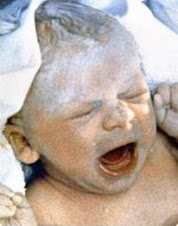A fertility test that doubles the chances of pregnancy offers new hope to childless couples.
The test helps identify the healthiest embryos for use in IVF treatment and could cut the risk of twins or triplets.
A trial involving couples
British experts are hoping to get permission from the fertility regulator here to offer it to women within the next few months.
Unlike most existing checks for a small number of abnormalities in embryos, the new CGH ( comparative genomic hybridisation) test examines the full complement of normal chromosomes.
The test is also more accurate because it can safely remove a greater number of cells from embryos for DNA testing before the healthiest ones are chosen. Findings from a trial at the Colorado Centre for Reproductive Medicine, near Denver, used results from women with hard-totreat infertility, where previous IVF attempts failed or ended in miscarriage.
They showed the chances of an embryo implanting in the womb were 62 per cent - more than double the 27 per cent rate expected.
Out of 23 women aged between 30 and 42 taking part in the trial, 18 conceived and their pregnancies passed the 12-week stage.
The predicted live birth rate is 78 per cent, which compares with an anticipated 62 per cent in this group.
Two have given birth and four more are expected to deliver their babies by the end of the year, according to data presented yesterday at the American Society of Reproductive Medicine in San Francisco.
Dagan Wells, of the Reprogenetics UK Clinic and the University of Oxford, whose team analyses DNA extracted from embryos at the Colorado clinic, said the findings were 'dramatic'.
He is hoping to offer the technique to couples for around £2,000, in addition to the cost of IVF treatment.
He predicted its use would reduce the occasions when multiple embryos have to be implanted.
'The pregnancy rates we've got so far are absolutely phenomenal. We're ready to begin a trial in the UK,' he said.
SOURCE: dailymail.co.uk
Thursday, December 25, 2008
Friday, December 12, 2008
Indian woman gives birth aged 70: report
An Indian woman has given birth to her first child at the age of 70 after receiving IVF treatment, newspapers reported her doctor as saying.
Rajo Devi, who married 50 years ago, gave birth to a baby girl on November 28 after in vitro fertilisation, said Anurag Bishnoi, a doctor at the Hisar fertility centre in Haryana state.
"Rajo Devi and [her husband] Bala Ram approached the centre for treatment and the embryo transfer was done on April 19," he told the Hindustan Times.
"Both the mother and child are in good health."
Dr Bishnoi claimed Ms Devi was the world's oldest mother.
Another 70-year-old Indian was reported to have given birth to twins via IVF in July this year, while a 66-year-old Spanish woman had twins in 2006.
Ms Devi's husband, aged 72, had also wed his wife's sister after 10 years of his first marriage did not result in children. His second wife also failed to become pregnant.
It was not clear whose egg and sperm were used in the successful treatment.
"IVF has revolutionised the way we look at infertility," said Dr Bishnoi.
"Infertility is no longer a social taboo or a divine curse. It can be treated scientifically."
Rajo Devi, who married 50 years ago, gave birth to a baby girl on November 28 after in vitro fertilisation, said Anurag Bishnoi, a doctor at the Hisar fertility centre in Haryana state.
"Rajo Devi and [her husband] Bala Ram approached the centre for treatment and the embryo transfer was done on April 19," he told the Hindustan Times.
"Both the mother and child are in good health."
Dr Bishnoi claimed Ms Devi was the world's oldest mother.
Another 70-year-old Indian was reported to have given birth to twins via IVF in July this year, while a 66-year-old Spanish woman had twins in 2006.
Ms Devi's husband, aged 72, had also wed his wife's sister after 10 years of his first marriage did not result in children. His second wife also failed to become pregnant.
It was not clear whose egg and sperm were used in the successful treatment.
"IVF has revolutionised the way we look at infertility," said Dr Bishnoi.
"Infertility is no longer a social taboo or a divine curse. It can be treated scientifically."
Subscribe to:
Comments (Atom)
| Powered By widgetmate.com | Sponsored By Digital Camera |






